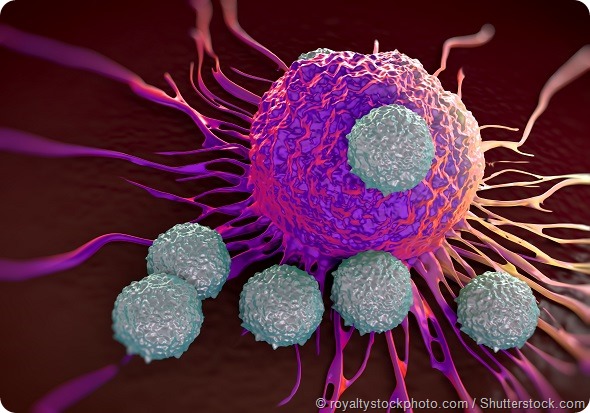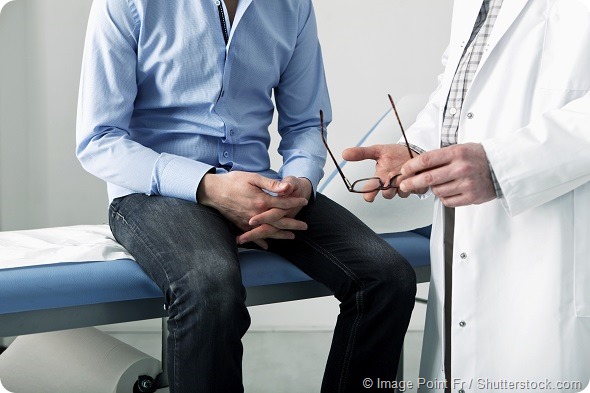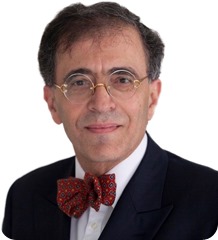We all produce as many as 100,000 different types of cancer cells every day, which are recognized and eliminated by our extraordinarily efficient immune system.
However, if something goes wrong with the immune system, and it no longer gets rid of these cells, then that’s when cancerous cells grow and become a problem.

Sometimes the immune system is less efficient so that cells that could become tumors grow and are not eliminated. This is a state of equilibrium where neither the body nor the tumor is winning.
The classic case of this type of equilibrium is prostate cancer: 80% of all men and quite possibly 100% if they live long enough, will get prostate cancer. However, for most the cancer will co-exist as a chronic disease that the body can hold in check.

However, sometimes a point comes when the tumor escapes and becomes dangerous, and that’s when we need to act. This point can be triggered by any number of things often related to stress.
In malignant melanoma for example it can be as simple as a broken arm or a dental abscess; an emotional stress like a loved one dying; or for breast cancer, it could be a change in hormone balance.
Thus the focus should not be first on fighting a cancer that is essentially “dormant” and not doing any harm, but on fighting those cancers where a tumor escapes this equilibrium.
In truth, if we can turn cancer into a chronic disease by putting it back into an equilibrium, then that is an achievement. Then later we can focus on elimination.
Helping the immune system to do its job, and fight the cancer to a point of equilibrium and then potential elimination, is something I have been interested in for many years, and have put into practice through Immodulon.
How can the immune system help to fight cancer and what new approaches in this field are needed?
Innate immunity – or non-specific or in-born immunity – defends the organism, and is the evolutionary oldest protection system we developed.
The non-specific first line of defense against a challenge (be it a pathogen or a cancer cell) is mediated by dendritic cells (DCs), natural killer (NK) cells, macrophages, neutrophils, basophils, eosinophils and mast cells.
These cells are sentinels stationed in tissues, which continuously patrol their microenvironment and respond quickly and bluntly to any signs of danger.
Adaptive immunity, provides long-lasting immunity and is acquired. It involves a learning process by the body’s immune system and needs the help of the innate immune system during the learning process.
The more sophisticated response is mediated by lymphocytes (T and B cells) and is targeted to specific antigens and result in memory responses.
%20is%20a%20peptide%20from%20a%20tumor%20cell%2c%20bacteria%20or%20virus.%20-Juan%20Gaertner-590.jpg)
Most immunotherapy treatments for cancer at the moment are focused on the adaptive immune system, like for example, check point inhibitors and T cell technology.
But we are excited to be exploring at the moment the body’s power to harness both the adaptive and innate immune systems, through our work with whole-cell heat-killed non-pathogenic mycobacteria.
Our products work with both systems. The key is for the body to amplify its response to the cancer while not inducing an overreaction that can destroy healthy cells, and our products have been shown to do this, as well as to help the body to remember which cells it needs to fight in the future.
What do you think the future holds for cancer therapies?
It’s essential that we look at cancer treatments in the context of all available treatments. We envision that even with the development of immunotherapies, we will still need to use radiotherapy to damage the tumor and conventional chemotherapy to shrink the tumor, and surgery to remove the tumor.
However, some very exciting results in trials of our recent product, shows that you can enhance the body’s response, and therefore support the other treatments.
We therefore see that the future of cancer treatments is in combination therapy, and that’s where immunotherapies, in particular those, like ours, working on many different pathways, will make the most difference.
We are not taking any of the oncologists’ tools away. They will still use chemotherapy, surgery and radiotherapy. These are all fundamental. We just need to adapt that combination to the cancer and most important, to the individual.
We are focusing our future trials specifically on combining our lead treatment with other treatments for cancer, in the hope that we find some really effective combinations for different types of cancer.
Where can readers find more information?
About Dr Charles Akle
In 2007, Harley Street surgeon Charles Akle established Immodulon Therapeutics [‘Immodulon’] with the philanthropic support of a former patient.
His ambition from the start was to bring to market an affordable immunotherapy treatment that would transform the way that cancer is treated in the world today.
Since then, Immodulon has become a leading biopharmaceutical company with one of the longest running research projects into how to harness the power of the immune system in treating cancer.
Charles Akle received his medical training at Guy’s Hospital London and subsequently carried out research into the immunology of the human amnion, resulting in a paper being published in the journal Nature.
During a career of more than 30 years as a leading surgeon, Charles pioneered the innovation of laparoscopic surgery, facilitating minimally invasive procedures as an alternative to major operations. The fact that such procedures are now considered routine rather diminishes the true benefit to patients and healthcare costs as a result of reduced hospitalization.